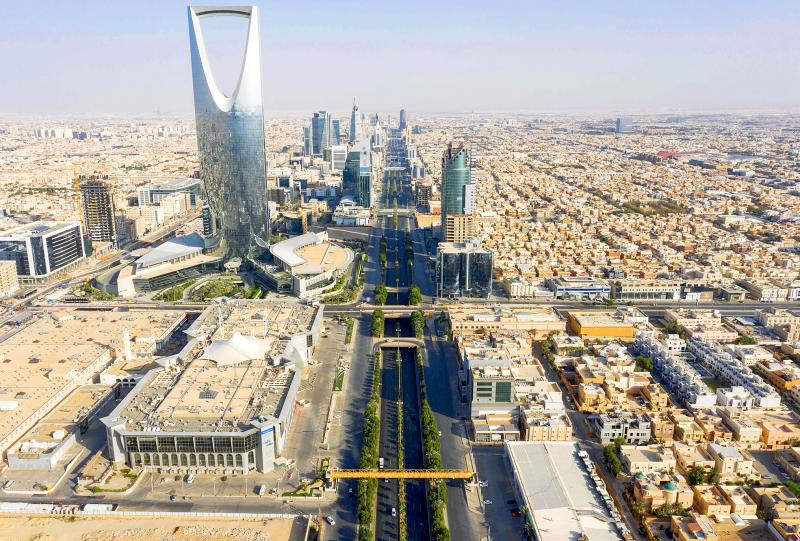Saudi Arabia is to pump 50 billion riyals (US$13.3 billion) into the banking system to help manage the fallout from the COVID-19 pandemic and the drop in oil prices.
The move by the Saudi Arabian Monetary Authority (SAMA) would support financial stability and boost credit facilities to the private sector, the central bank said in a statement yesterday.
The program is aimed at helping banks amend and restructure loans without additional fees and support private sector employment.

Photo: AFP
As a result of the virus outbreak, Saudi banks are “expected to encounter a reduction in activities in 2020, which will reflect negatively on profitability and possibly increase defaults,” the central bank said in its Financial Stability Report published last week.
Hit simultaneously by lower crude prices and coronavirus shutdowns, Saudi Arabia’s non-oil economy is expected to contract for the first time in more than 30 years.
The central bank had previously unveiled a 50-billion-riyal program to help mostly small private businesses in the country.
In March, the regulator urged banks to put in place a lending program for at least six months to “assist in maintaining employment levels,” according to a document sent by the regulator to lenders and seen by Bloomberg.
Saudi Arabian Minister of Finance Mohammed al-Jadaan said in a statement over the weekend that the government had also transferred 150 billion riyals from SAMA’s foreign reserves to the Public Investment Fund, the kingdom’s sovereign wealth fund, in March and April to help it finance a buying spree of assets in international markets that had dropped in value as a result of recent turmoil.
Saudi Arabia’s fiscal deficit this year is set to widen to nearly 13 percent of GDP, according to the IMF.
Gross official reserves are set to drop to about US$456 billion this year, continuing the trend into next year, when they are estimated at just more than US$409 billion, IMF projections show.
At the end of April, the central bank’s net foreign assets stood at US$443 billion.
The kingdom could borrow 220 billion riyals this year, about 100 billion riyals more than it forecast before the outbreak, while keeping its drawdown from reserves at up to 120 billion riyals.

ISSUES: Gogoro has been struggling with ballooning losses and was recently embroiled in alleged subsidy fraud, using Chinese-made components instead of locally made parts Gogoro Inc (睿能創意), the nation’s biggest electric scooter maker, yesterday said that its chairman and CEO Horace Luke (陸學森) has resigned amid chronic losses and probes into the company’s alleged involvement in subsidy fraud. The board of directors nominated Reuntex Group (潤泰集團) general counsel Tamon Tseng (曾夢達) as the company’s new chairman, Gogoro said in a statement. Ruentex is Gogoro’s biggest stakeholder. Gogoro Taiwan general manager Henry Chiang (姜家煒) is to serve as acting CEO during the interim period, the statement said. Luke’s departure came as a bombshell yesterday. As a company founder, he has played a key role in pushing for the

China has claimed a breakthrough in developing homegrown chipmaking equipment, an important step in overcoming US sanctions designed to thwart Beijing’s semiconductor goals. State-linked organizations are advised to use a new laser-based immersion lithography machine with a resolution of 65 nanometers or better, the Chinese Ministry of Industry and Information Technology (MIIT) said in an announcement this month. Although the note does not specify the supplier, the spec marks a significant step up from the previous most advanced indigenous equipment — developed by Shanghai Micro Electronics Equipment Group Co (SMEE, 上海微電子) — which stood at about 90 nanometers. MIIT’s claimed advances last

CROSS-STRAIT TENSIONS: The US company could switch orders from TSMC to alternative suppliers, but that would lower chip quality, CEO Jensen Huang said Nvidia Corp CEO Jensen Huang (黃仁勳), whose products have become the hottest commodity in the technology world, on Wednesday said that the scramble for a limited amount of supply has frustrated some customers and raised tensions. “The demand on it is so great, and everyone wants to be first and everyone wants to be most,” he told the audience at a Goldman Sachs Group Inc technology conference in San Francisco. “We probably have more emotional customers today. Deservedly so. It’s tense. We’re trying to do the best we can.” Huang’s company is experiencing strong demand for its latest generation of chips, called

GLOBAL ECONOMY: Policymakers have a choice of a small 25 basis-point cut or a bold cut of 50 basis points, which would help the labor market, but might reignite inflation The US Federal Reserve is gearing up to announce its first interest rate cut in more than four years on Wednesday, with policymakers expected to debate how big a move to make less than two months before the US presidential election. Senior officials at the US central bank including Fed Chairman Jerome Powell have in recent weeks indicated that a rate cut is coming this month, as inflation eases toward the bank’s long-term target of two percent, and the labor market continues to cool. The Fed, which has a dual mandate from the US Congress to act independently to ensure